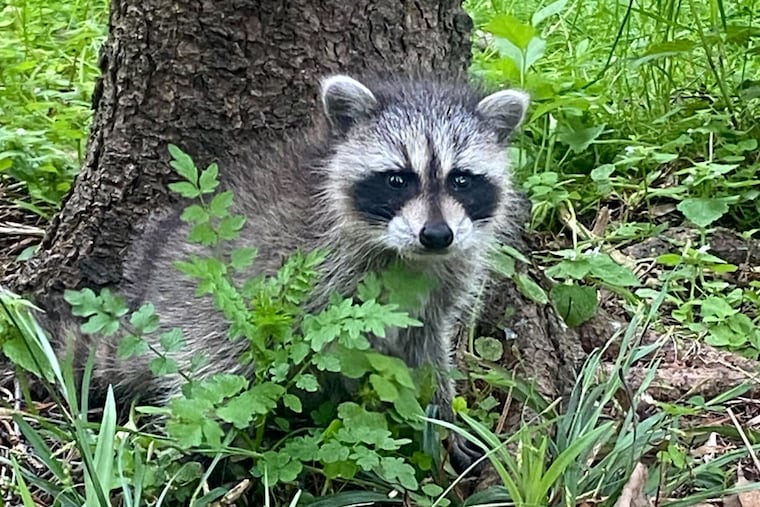Rabid raccoons in West Philly? No definitive proof yet, but animal control says it’s better to be safe.
Here’s what to know about the trashcan bandits and what you should do if one gets aggressive with you.

It was the third night Elaine Jenson could hear raccoons fighting somewhere in the darkness of her West Philadelphia backyard. Looking for some peace, the self-described farm girl grabbed a flashlight Sunday and peered out of her deck, seeing a raccoon make its way through the alley and toward Clark Park.
“Then I turn and look and there’s the other one up in a tree,” said the 65-year-old. “And all of a sudden, just that quick, he falls out of the tree and starts running at me.”
Jenson couldn’t outrun the raccoon, which latched onto her ankle. In her effort to shake it off, Jenson inadvertently flung her soft clog shoe off. The raccoon then got its teeth into her foot and didn’t let go until Jenson hit it with her flashlight.
Jenson’s encounter was one of several sightings in West Philly in the past week. Another person avoided scratches after being chased by a startled raccoon. Word of aggressive and possibly rabid critters circulated online, with alleged sightings reported at 48th Street and Warrington Avenue and 49th Street and Baltimore Avenue.
Still, the Pennsylvania Game Commission and local animal control say these incidents don’t necessarily signal a rabies outbreak or raccoons taking an aggressive turn in behavior, but they commend people who are taking rabies, which is almost always deadly, seriously.
“It’s not that raccoons are more aggressive but if you look at the number of people and the number of raccoons, there’s going to be overlap,” said Sarah Barnett, executive director of ACCT Philly.
The Pennsylvania Department of Agriculture recorded 81 cases of rabies in the first half of 2023. Just over half of those cases were raccoons, including seven cases in Philadelphia.
ACCT often gets reports of raccoons in homes, rummaging for food, or dispatches of the trash can bandits strutting down the street in broad daylight — previously a telltale sign of the nocturnal animal having rabies.
Yet a raccoon in the light of day doesn’t necessarily signal rabies in an urban setting these days. Like other animals, raccoons have adapted to cosmopolitan living.
“They’re totally used to it at this point,” said Barnett. “These are like the fattest, most domesticated raccoons.”
That’s a problem in and of itself, as ACCT Philly recently had to send a raccoon to rehab because it didn’t know how to be in the wild and remained paralyzed in the same spot for hours after animal control set it free.
ACCT Philly has not captured rabid raccoons or heard about the encounters reported online this week, Barnett said, though that doesn’t mean they haven’t taken place. Though animal control and other agencies, including the health department, work together, there’s no central reporting system.
The Philadelphia Health Department doesn’t hear about these incidents unless someone goes to the hospital to begin the four-dose rabies vaccine treatment.
Jim Crown, the Game Commission warden for Philadelphia, said he received two reports about aggressive raccoons in West Philly this week, but he was unable to get in touch with the reporters.
What to do if you see a raccoon
Without an animal brain to test, animal control and the Game Commission can’t know for sure if the animal in question is sick. Yet the advice some residents have been passing around is generally correct.
Sure, they’re cute, they’re smart, but raccoons can carry rabies, so don’t go near them. Keep your head on a swivel, and keep an eye out for changes in animal behavior. If you have a backyard frequented by typically respectful raccoons that suddenly start acting erratic, ACCT recommends bringing pets indoors and giving them or the Game Commission a buzz. There’s no right or wrong agency to call as they all work together.
When you call, be specific. Barnett said it’s helpful to know what aggressive behavior an animal is exhibiting.
Locking up sources of food, such as trash cans, is also a way to reduce the chances of an unexpected standoff.
Most importantly, should a raccoon or other rabies-carrying animal get up close and personal — even if you don’t feel noticeable scratches — rabies is the sort of illness where it’s better to be safe than sorry. The earlier people start the vaccine cycle, preferably in the first 24 hours, the better.
Jenson said the whole experience has taught her more about raccoons, and she hopes people learn from her experience. She heard of someone following one of the aggressive raccoons and trying to take its photo to send to animal control.
“I would hope that they are cautious,” she said.